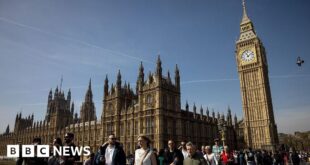Some of Mr. Corbyn’s economic plans are indeed foolish. Others are sensible, progressive and in use elsewhere.
SIMON DAWSON/Reuters
Jeremy Corbyn could be Britain’s next prime minister. A vote for his Labour Party is a vote for undiluted, Hugo Chavez-style Marxism. It would be a vote for an economy-wrecking transfer of wealth from corporations to workers, a vote for mass nationalizations, a vote to resurrect command-and-control economics from the scrapyard of history.
Or so say Mr. Corbyn’s many critics, which, as far as I can tell, include roughly two-thirds of the mainstream British media, led by the Labour-hating Daily Telegraph, Daily Mail and Sun newspapers. Even the left-leaning Guardian, which would endorse a tree stump before backing Conservative Prime Minister Boris Johnson, has some doubts about Corbynism.
To be sure, Mr. Corbyn’s economic agenda is unaffordable. Is that a surprise? No economic agenda promised by any politician in the history of electioneering is affordable. A few days ago at the Tory party’s annual conference, Mr. Johnson, reeling from two sex scandals, went into full vote-buying mode and promised to build 40 new hospitals for the National Health Service. How the biggest-ever gift to the NHS would be financed was left unsaid. Perhaps he would list all the royal palaces on Airbnb? As it turned out, the 40-hospital tally was rather quickly downgraded to six.
Yes, Mr. Corbyn’s economic plans would bankrupt the country by lunchtime if they were all put into place. But not all his ideas are daft. Many of them are already in place in some of the more enlightened and competitive bits of Europe, Germany among them.
Take Labour’s vow to renationalize rail, water, energy and the Royal Mail. Every British poll shows majority support for state ownership of utilities, schools, rail and the BBC, sometimes overwhelmingly so. A recent YouGov poll found that 60 per cent of respondents want nationalized rail services.
The privatization of British rail in the mid-1990s, under John Major’s Conservative government, is widely viewed as a disaster. Britain has no operating high-speed trains. Its ticket cost per mile travelled is among the highest in the world. The trains are shabby and on-time service is abysmal. The rail systems in France, Germany and Italy are largely in state hands and are far better. Privatizing such natural monopolies is never a good idea. Even the United States left Amtrak in public hands.
Another Labour idea is free university tuition. Hardly a radical idea. Germany, France, Sweden, Austria, Finland, Denmark and Norway all have free or almost free postsecondary education. The wealth divide in Britain and the piles of student debt are becoming obscene. Free university is one way to help correct these injustices. British residents had free tuition until 1998, when the Labour government of Tony Blair introduced fees.
Labour wants companies with more than 250 employees to reserve a third of their board seats for workers. A third may seem excessive until you consider that big German companies require 50-per-cent employee representation on their supervisory boards. In the U.S., Elizabeth Warren, who is now tied with front-runner Joe Biden in the race to become the Democratic presidential nominee, is a fan of employee representation on boards.
Of course, more than a few of Labour’s plans are either unrealistic or plain crazy. Labour has called for a 32-hour work week. Never mind that France’s experiment with a 35-hour week has produced decidedly mixed results. Labour’s vow to kill off private schools is just theatrics, even though the idea tickles the fancy of populists and a good number of anti-Brexiters (the Brexit-loving Mr. Johnson and David Cameron, the prime minister who launched the 2016 Brexit referendum, are both products of elite Eton College). Labour’s idea to force companies to transfer as much as 10 per cent of their shares to their workers would, if implemented, trigger a massive exodus of companies from Britain.
But if you think the Conservatives’ generally non-interventionist economic policies are easier sells, and potentially far less disruptive, consider Brexit.
Brexit is actually the ultimate government-induced interventionist policy. A no-deal Brexit has the potential to inflict severe damage on the British economy, and there is no sign the Conservatives have a workable plan to prevent the just-in-time supply lines that keep factories running from breaking down overnight. Industry is already leaving Britain – Ford and Honda announced plant closings this year – and British banking under any Brexit scenario will shed many thousands of jobs.
The European Union will move with alacrity to take financial business away from the Brits (it already has). Last month, the euro zone’s bailout fund, the European Stability Mechanism, said it would stop issuing bonds governed by English law; it is switching to Luxembourg law. The switch was triggered by Brexit, and the chipping away at Britain’s financial industry will continue. Some of Mr. Corbyn’s economic plans are indeed foolish. Others are sensible, progressive and in use elsewhere. Brexit, the Conservatives’ signature economic policy, is an act of vandalism.
Source link


